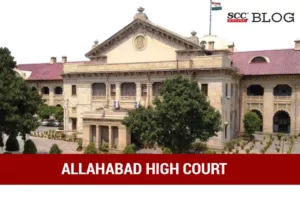Allahabad High Court: In an appeal filed under Section 19 of the Family Court Act, 1984 arising from the judgment and order dated 17-3-2020 passed by Additional Principal Judge, wherein the Court has dismissed the divorce proceeding instituted by the appellant/ husband, under Section 13 of Hindu Marriage Act, 1955 (‘HMA’) on the ground of cruelty, the division bench of Saumitra Dayal Singh and Shiv Shanker Prasad, JJ. has said that the allegation of cruelty was not made out. Thus, to that extent, the Court below has not erred in refusing to dissolve the marriage between the parties. However, it erred in not considering the grant of alternative relief in terms of Section 13A of the Act. Thus, the Court modified the decree and granted a decree of judicial separation to the husband.
The parties married in 2013, however their marriage was not consummated. Since July 2014, they have not lived together for a single day. The husband submitted that the wife refused to consummate the marriage. She misbehaved with her in-laws and had assaulted them. Thereafter, she had instigated a mob to chase and assault the husband accusing him to be a thief. Further, allegations regarding dowry demand were made against the husband. During the course of the divorce proceedings, the wife made a scandalous allegation against the husband, of having an illicit relationship with his sister-in-law.
The Court noted that the wife had gone to meet the husband at his residence. However, she was prevented from entering the residential society at his and his family members instance. Finally, when the husband came out, the wife claimed to have made efforts to speak to him. Since he avoided meeting her, she ran behind him. According to the husband, the wife started shouting “thief, thief” whereupon a mob gathered and chased down the husband and assaulted him and also restrained him and his parents. On the other hand, the wife claimed that the mob, on its own, chased the husband and restrained him and others. However, she did admit that the police also came to the spot and restrained the husband and his parents.
The Court said that it does not appear that there are serious disputes between the parties. Further, both parties claim that the marriage was never consummated over ten years. Prima facie, it may not be accepted that the mob would have chased the husband out of any other occurrence. Suffice to note that such conduct may not be a normal conduct within the members of the family. To instigate a mob on a false allegation only for the purposes of causing embarrassment may never be accepted as normal conduct. However, no formal arrest was made and no FIR. was lodged on such false allegation. Thus, it may not complete the ingredients of cruelty that are necessary to be established for the purposes of grant of decree of divorce.
The Court said that if the courts were to recognize and act on small disputes or occurrences and read them as completion of ingredients of cruelty, many marriages where parties may not be enjoying best relations may stand exposed to dissolution without any real cruelty being committed.
The Court said that cruelty is not defined under HMA, yet it has to be an act serious enough as may not allow a prudent person an opportunity or conviction to resolve matrimonial discord being faced by them or as may not burden them to continue to live in matrimony. Such acts, by very nature, must include things or occurrences of very serious nature having deleterious effect on the relationship such as may be seen to prevent the parties to seek reconciliation.
Further, the Court said that the allegation of one party having an illicit relationship with another must be clear. The wife may have only stated this much, that instead of respecting the matrimonial relationship between them the husband chose to sleep in another room occupied by his sister-in-law and her children. Thus, the allegation of illicit relationship was not made by the wife.
Hence, the allegation of cruelty was not made out and to that extent, the Court below has not erred in refusing to dissolve the marriage between the parties. However, it erred in not considering the grant of alternative relief in terms of section 13A of the Act.
The Court said that the dispute between the parties having arisen immediately after their marriage and it being a proven fact that their marriage has neither been consummated nor they have cohabited for nine years, clearly indicates lack of bond between the parties. Further, in absence of any proceedings for restitution of conjugal rights by either party, the court below ought to have granted a decree for judicial separation by way of alternative relief.
The Court said that limited interference is required to be made at this stage in as much as ten years have passed since the marriage was solemnized between the parties. They have not cohabited for more than nine years now. There is no child born to the marriage and there is no hope seen existing of any reconciliation today. Thus, the Court modified the decree and granted a decree of judicial separation to the husband.
[Rohit Chaturvedi v Neha Chaturvedi, First Appeal No. 295 of 2020, Order dated 03-11-2023]
Advocates who appeared in this case :
Counsel for Appellant:- Advocate Satish Chaturvedi
Counsel for Respondent:- Advocate Yogendra Pal Singh

